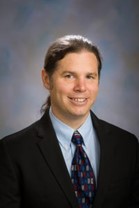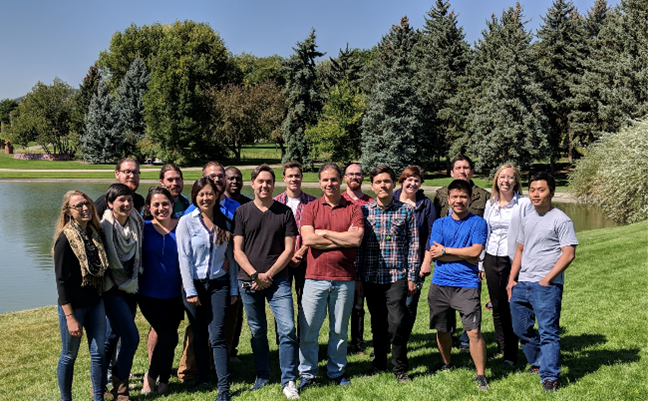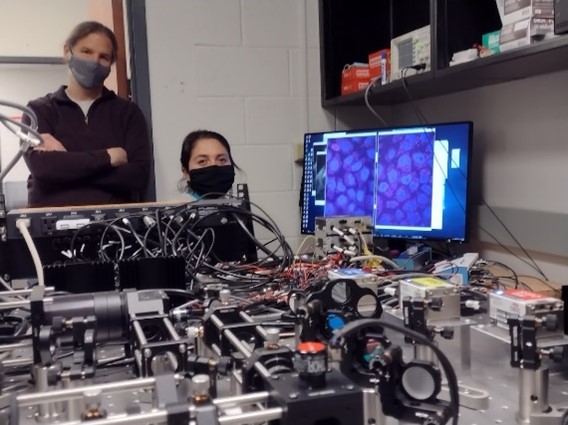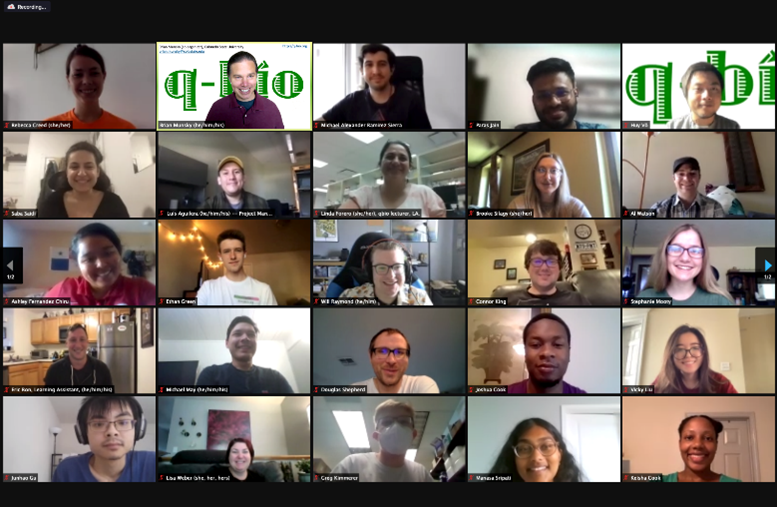 Dr. Brian Munsky. Credit: Colorado State University.
Dr. Brian Munsky. Credit: Colorado State University.
“I think having a career in science is really the best way to rechannel the inner child, to remain forever curious about the world,” says Brian Munsky, Ph.D., an associate professor of chemical and biological engineering at Colorado State University, Fort Collins. Check out the highlights of our interview with Dr. Munsky below to learn how his childhood practical jokes led to him running a research group that uses computational and experimental methods to study complex processes inside cells.
Q: How did you become interested in science and math?
A: I really enjoyed math problems from the time I was very little. Then in 1986, my parents brought home one of those really early computers, an Apple 2C, and I’d take little bits of code from the computer games they’d bought and create my own video games out of them. I also liked to play practical jokes on people. When I was in 7th grade, I reprogrammed all the computers in a classroom so that a few minutes into the next class period, when I was nowhere around, they all started playing “The Star-Spangled Banner.” The school never caught me for that, although I suspect they knew who was responsible.
Q: What was your path to becoming a scientist?
A: I started college at Pennsylvania State University as an English major because my heroes were primarily science fiction writers. But I was still very interested in mathematics and physics, so I took a statics and strength of materials course. The professor’s demonstrations using mathematics to solve real-world problems inspired me to switch my major to aerospace engineering. I was fortunate to land a student research job exploring how the rotor blades of a helicopter create and interact with vortices in the air. When the helicopter blades hit these vortices, they generate the pounding whomp, whomp, whomp sound we hear as a helicopter lands.
It was very cool mathematics, but I quit after earning my master’s degree because I couldn’t imagine spending the entirety of my life designing machines only affordable to the world’s wealthiest people. I took a year off and traveled the country, living out of a small Ford Escort and applying for graduate programs. I wanted to study the mathematics of control theory that enable the design of automated machines and robots, and this interest led me to Drs. Mustafa Khammash and Hana El‑Samad, who were applying control theory to study biological processes at the University of California, Santa Barbara. That’s where I got my Ph.D., developing lots of new mathematical tools to understand gene regulation in E. coli bacteria.

After graduation, I completely switched disciplines again, and I went to work in a physics lab at Los Alamos National Laboratory as a postdoc fellow and eventually as a full-time research scientist. During my time there, I got involved in the annual Quantitative Biology (q-bio) Summer School. I joined q-bio as a student in 2007 and a lecturer in 2008 and 2009 before taking over organizing the program in 2010. That experience really got me back into community building and education, and it motivated my return to academia. I eventually became an assistant professor in yet another discipline—chemical and biological engineering—at Colorado State University in 2014.
Q: What’s the focus of your research group?
A: My group is really interested in combining computational models with single-cell measurements from experiments. The goal is to understand and predict how gene-regulatory pathways are controlled and how these control mechanisms change under different conditions, such as during bacterial or viral infections. We hope that by developing precise and predictive quantitative tools to understand these mechanisms, we can provide future biomedical scientists with improved diagnostic capabilities and approaches to more efficiently design and test new therapeutics.

Q: What challenges have you faced in your career?
A: Each time I switched fields, I’d find that I was starting from ground zero, not knowing the appropriate language or having the right connections. It was very easy to feel like I just didn’t really belong. My answer to this challenge was to really double down on collaboration. I found that by surrounding myself with teams of diverse scientists, I learned how to recognize their various strengths and to appreciate myself as well. I didn’t have to know all the same things as everybody else on the team; I just needed to be able to communicate with them.
Q: What do you see as your biggest accomplishment so far?
A: What I’m really proudest of is the impact I’ve had through the q-bio Summer School program. Through the summer school, we’ve built this strong network of several hundred, or maybe even a couple thousand, students and research scientists seeking to integrate experiments with computational approaches. Several dozen of our former students are now teaching in institutions all over the world. A few years ago, we even completed a community-written textbook on methods and models in quantitative biology. I think it’s so impressive how this young community is really enthusiastic and continually pushing the boundaries of what it means to be a biologist.

Through 2020, q-bio had always been for senior graduate students and postdocs, but we recently launched a newer program that’s primarily focused on undergraduate and early stage graduate students, a program that we’ve named Undergraduate Quantitative Biology (UQ-bio) Summer School.
Q: What advice do you have for students interested in pursuing a career in science?
A: Think of science as a team endeavor. We all play a different position on this team, so don’t try to learn it all or to do everything yourself. Study the aspects of science that you find most interesting; figure out how to apply your skills and knowledge to help others; and look for a group of friends, colleagues, and mentors who will both challenge and support you.
Dr. Munsky’s research is supported through the NIGMS Maximizing Investigators’ Research Award program by grant R35GM124747.

